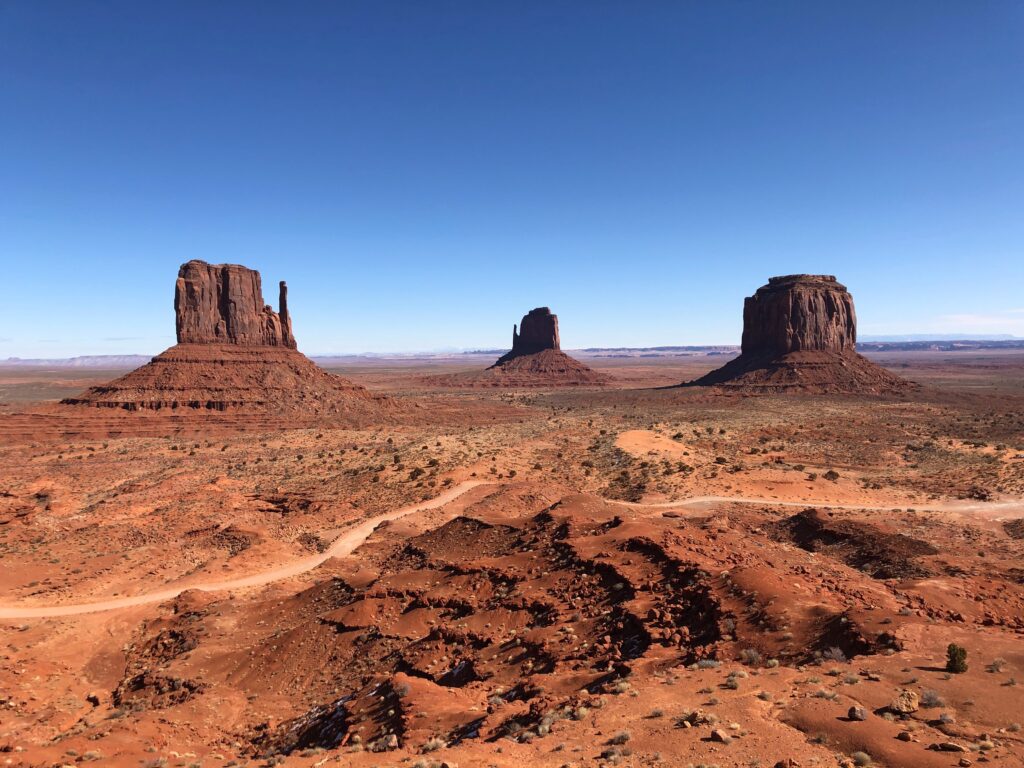By Madelyn Happ
On the Navajo Nation reservation, the largest reservation in the United States with a size near that of West Virginia, an estimated 30% of the population does not have access to clean, reliable drinking water.[1] Many drive long distances to gather their drinking water from unregulated sources like springs and livestock wells.[2] It is estimated that there are over a thousand unregulated water sources from which members of the Navajo Nation draw drinking water; their unregulated status making the safety and cleanliness of the water unknown.[3] The official policy of the Navajo Nation Environmental Protection Agency prohibits human consumption of water from these unregulated sources, but the use is still widespread due to the lack of water access from other sources.[4]
This limited access to safe drinking water on the reservation and the changing dynamic of water resources across the Western United States generally have made water an even more precious resource and water rights a contentious legal battleground for the Navajo. Most of the water used on the Navajo reservation comes from the San Juan River, a tributary of the Colorado River.[5] Seven states and multiple Native American tribes also draw water from the Colorado.[6]
On Monday, March 20, 2023, the Supreme Court will hear oral arguments on the case Arizona v. Navajo Nation. In this case, the Navajo Nation argued that when the Federal Government claimed water rights from the Colorado River on behalf of other Native American tribes, but not the Navajo, it breached its trust obligations.[7] The 9th Circuit ruled in favor of the Navajo Nation, stating that the tribe was entitled to bring forward a breach of trust claim and that the Federal Government had a “irreversible and dramatically important trust duty requiring them to ensure adequate water for the health and safety of the Navajo Nation’s inhabitants in their permanent home reservation”.[8] This trust duty stems, under the doctrine set forth in Winters v. United States, from the 1868 treaty in which the U.S. Government agreed that the Navajo reservation would be a “permanent home.”[9] From this promise of a permanent home, the 9th Circuit found “necessarily implied rights” to enough water to make the land a home, i.e. adequate drinking water and other water to farm.
Arizona and the Department of the Interior argue the 9th Circuit erred in its ruling.[10] Both articulate that the 9th Circuit’s finding of “implied rights” is contrary to other Supreme Court holdings that the trust responsibilities assumed by the United States are only those that are explicit in treaties and statutes.[11] By allowing for these implied water rights, it then would threaten all other nontribal water demands across the west. Further, Arizona asserts that the 9th Circuit did not have jurisdiction over the issue as the Supreme Court retained the ability to oversee the allocation of water from the Colorado River in Arizona v. California.[12]
Indicative of the conscientiousness of the issue of water rights in the Western United States is the amount of amicus briefs filed in support and opposition of both parties. In a brief written by various law professors, the strained history of U.S. trust obligations and water rights is clearly demonstrated.[13] This history shows that the United States has continually favored non-Indian water needs over that of the known needs of the Navajo Nation.[14] The Federal Government itself has acknowledged this, stating in the final report of the National Water Commission that “in the history of the United States Government’s treatment of Indian tribes, its failure to protect Indian water rights for use on the Reservations it set aside for them is one of the sorrier chapters”.[15]
Further, in an amicus brief filed by 37 tribal Nations and other Indian organizations, the benefits of retaining the Winters doctrine are those that apply to all concerned parties in the Western United States.[16] The Winters doctrine “enables states, the federal government, and Tribal Nations to determine the availability of waters for appropriation by all users, and to more accurately manage water resources.”[17]
Therefore, rather than Arizona’s argument that the upholding of the Winters doctrine would widely threaten water rights, the Winters doctrine is precisely what would allow the allocation of water in the West more certainty.[18] For “certainty is a critical objective of Western water law,” and one of its largest contributors is the Winters doctrine.[19] If the Supreme Court were to limit this doctrine and rule in favor of the Petitioners, the battle over water rights in the American West could develop into an even more treacherous landscape.
[1] About DWR-Executive Summary, Navajo Nation Dep’t of Water Res., https://nndwr.navajo-nsn.gov/; Emily Litvack, On Navajo Nation, Taking Clean Water Off the Grid, Univ. Ariz. (Sept. 2019), https://research.arizona.edu/stories/navajo-nation-taking-clean-water-grid
[2] Emily Litvack, On Navajo Nation, Taking Clean Water Off the Grid, Univ. Ariz. (Sept. 2019), https://research.arizona.edu/stories/navajo-nation-taking-clean-water-grid
[3] Id.
[4] Id.
[5]David G. Savage, Supreme Court will reconsider Navajos’ claim for more water from the Colorado River, L.A. Times (Nov. 2022), https://www.latimes.com/politics/story/2022-11-04/supreme-court-will-reconsider-navajos-claim-for-more-water-from-the-colorado-river
[6] John Elwood, Intellectual property and Navajo water rights, SCOTUSblog (Nov. 2022), https://www.scotusblog.com/2022/11/intellectual-property-and-navajo-water-rights/
[7] Id.
[8]David G. Savage, Supreme Court will reconsider Navajos’ claim for more water from the Colorado River, L.A. Times (Nov. 2022), https://www.latimes.com/politics/story/2022-11-04/supreme-court-will-reconsider-navajos-claim-for-more-water-from-the-colorado-river
[9] Id.
[10] Id.
[11]Dan Schweitzer, Case Granted Review: Arizona v. Navajo Nation, 21-1484; Dep’t of Interior v. Navajo Nation, 22-5, Nat’l Ass’n of Attorney’s Gen. (Nov. 2022), https://www.naag.org/attorney-general-journal/supreme-court-report-arizona-v-navajo-nation-21-1484-dept-of-interior-v-navajo-nation-22-51/
[12]David G. Savage, Supreme Court will reconsider Navajos’ claim for more water from the Colorado River, L.A. Times (Nov. 2022), https://www.latimes.com/politics/story/2022-11-04/supreme-court-will-reconsider-navajos-claim-for-more-water-from-the-colorado-river
[13] Brief for Prof. Daniel McCool et. al. as Amici Curiae Supporting Respondents, Navajo Nation et. al, Nos. 21-1484 and 22–51(2023).
[14] Id. at 22.
[15] Id. at 24.
[16] Brief of Tribal Nations & Indian Organizations as Amici Curiae Supporting Respondents, Navajo Nation et. al, Nos. 21–1484 and 22–51(2023).
[17] Id. at 31 (emphasis added).
[18] Id. at 32–33.
[19] Id. at 32.






